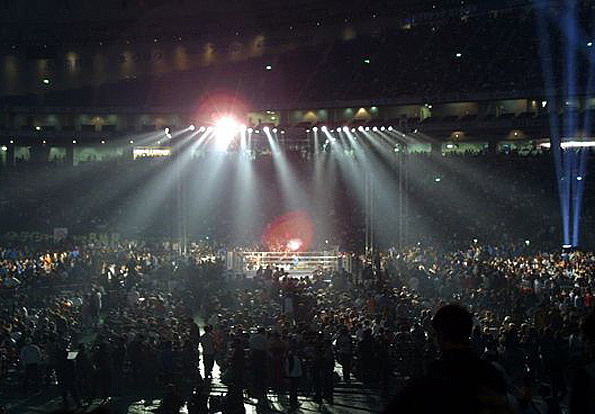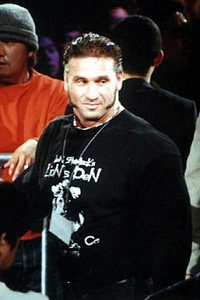Pride and Glory
First Blood
Jake Rossen Jun 23, 2010

File Photo: Sherdog.com
First Blood (Jan. 30, 2000)
ランボー (2000年1月30日)
Advertisement
Stephen Quadros, Play-by-Play Announcer: Going to the Tokyo Dome for the first time -- I was just in awe. I had never been in an arena like that, which was so spacious. It was high up, it was wide, it was like being in an underground city, like a biosphere. It’s like right when you come on to a psychedelic drug, right when you peak. That’s what it was like.
Michael Braverman, U.S. Producer: It’s
impossible to tell what things cost there. In Japan, this costs
this, but it doesn’t really cost that because I have a deal
with so-and-so. Japanese business is completely byzantine. Pride
spent whatever they had to spend on those shows.
Missing in Action
The fighters who almost made the GP field
Tom Erikson:The hulking freestyle
wrestler had perpetual trouble getting
bouts due to a smothering fighting style;
allegedly, some fighters had it guaranteed
in their contracts they would never have
to face the 6-foot-3, 285-pound fighter.
Erikson was not invited to the Grand Prix,
a slight he attributes to the possible
influence of other grapplers in the fold.
The fighters who almost made the GP field
Tom Erikson:The hulking freestyle
wrestler had perpetual trouble getting
bouts due to a smothering fighting style;
allegedly, some fighters had it guaranteed
in their contracts they would never have
to face the 6-foot-3, 285-pound fighter.
Erikson was not invited to the Grand Prix,
a slight he attributes to the possible
influence of other grapplers in the fold.
Enson Inoue: A lot of times, after a fight, fighters would go to shake hands with a Yakuza guy. He was always there. I don’t think the fighters knew who he was. He was one of the Yakuza backers of Pride. So they’d all go and bow down to him. I never got a chance to ask, “Do you guys know who that is?”
Adelstein: They loved to hang out with fighters. They love tough guys. Just like in the boxing industry. There’s a celebrity status to being seen with a fighter. You want to show you’re tough and hang out with tough guys. They’re totally fascinated with fighters and their life.
As the favorites advanced, it looked as though Pride would see their preferred field materialize. Sakuraba’s opponent, the Ken Shamrock-trained Guy Mezger, had other plans.
Guy Mezger: I was actually recovering from a kidney problem. They said they wanted me to fight Sakuraba on two weeks’ notice. They offered me six figures. They were notorious for doing stuff like that. I go, “All right, we’ll take the fight if it’s just one 15-minute round.” It was part of the contract. But I knew some kind of bullsh-t was going to be pulled.
Kazushi Sakuraba: When asked who I want to fight, I usually don't have an answer. But if asked who I don't want to fight, I could answer easily. Mezger. His fighting style is so boring.
Mezger: I’m sure he didn’t like Wanderlei Silva’s fighting style, either.
Sakuraba: The promoters told me to arrive at 2, but my fight wasn't until 5, so I decided it would be fine if I arrived around 3. But I left my house late and because of traffic ended up arriving at the arena at 4:30. Just as I was intensifying my running and thinking about taking a rest, the staff came and told me, "Please go to the entrance gate and stand by."
Mezger: For some reason, I had a tremendous amount of energy for that 15 minutes, but I started to kind of wilt near the end. Then they called it a draw and I’m like, “What?”
Quadros: They still had that 10kg handicapping. Let’s say a fighter was 10 kilos or more lighter than another fighter. He already had a point in the round, so you basically had to beat him more than someone your own size.
Mezger: That’s what they said. That’s how they justified it. The problem is, there wasn’t a 10 kilo weight difference. I was 199 pounds. I got the flu from Ken’s kids in training. I took four bags of fluids with me because I was so sick and dehydrated.

File Photo: Heath
Sims/Sherdog.com
Sakuraba: I wanted to go another round, thinking it would be possible to salvage the match, but when it was decide to extend the fight, Ken Shamrock was making scary faces.
Mezger: Everyone blames Ken for being unprofessional. Really, Ken was protecting his fighter. We had an agreement.
Quadros: Ken Shamrock is in the broadcast booth -- we’re sitting there and they say, “Draw, one more round.” Ken flips out and stands up and starts screaming at the judges, slams his headset.
Sakuraba: Later I heard that Mezger's contract was only for a one-round fight. I thought, "Ah, then it couldn't be helped." But Shamrock didn't have to get so angry like that. Seeing Mezger getting scolded by him, I felt sorry for him.
Matt Hume, Fight Judge: We knew nothing about that. I don’t doubt Ken had an agreement with them. What he claimed he was told was that it would be one round and then a decision would be made and that there would be no overtime. The officials knew nothing about a side agreement like that.
Hyams: I think that any advantage they could use, they would use. The best way I can illustrate that is, as a film crew we’d have to sit and have negotiations with these guys. Anytime we’d have negotiations with them, they would always do all of their business through an interpreter. Now, a lot of these guys could speak perfect English. That was the key to me that they could use that barrier to their advantage.
Braverman: Kenny went out of his mind. Kenny went crazy. He stormed into their office. I was going, “This can’t be good.” He was furious. Have you ever seen Kenny mad? It was one of the most terrifying things I’ve ever seen. He could eat your head if he felt like it. Kenny foaming at the mouth is enough to scare the sh-t out of anybody.
Mezger: They came straight to us. They did the whole dog and pony show. They had all the low-level management guys standing in a row with their heads bowed. They’re being yelled at by their guy. They’re apologizing and bowing to us for the misunderstanding. They do what Japan always does: they throw money at it.
Braverman: We had a big meeting. We were able to get some concessions out of them, money and guarantees of future fights. They wanted to make it right. One thing I said in the meeting was, “Do you want me to call Kenny back in here and see what he says?” “No, no, no, no!”
Missing in Action
The fighters who almost made the GP field
Randy Couture: He was offered a Pride
contract but opted to re-sign with the UFC
instead. He defeated Kevin Randleman to earn
his second heavyweight title in November 2000.
The fighters who almost made the GP field
Randy Couture: He was offered a Pride
contract but opted to re-sign with the UFC
instead. He defeated Kevin Randleman to earn
his second heavyweight title in November 2000.
Adelstein: This is a classic Japanese strategy of dealing with foreigners when anything goes wrong. “Oh, you don’t understand.” It’s a classic Yakuza technique as well. You blame everything on miscommunication. It wasn’t miscommunication. They probably just didn’t anticipate things would go this way, and then they needed to get out of it.
Mezger: Royce’s father came up to me after my fight and said, “You got screwed. You won that fight.” Here’s Helio Gracie walking up to me and telling me I got ripped off. Japan is notorious for the big f-cking.
Adelstein: In cases where there’s a Japanese player involved, the confusion is to the advantage of a Japanese person. It’s in the best interests of the promoters of these fights. When Japanese people get defeated by a foreigner, the sport’s newspapers don’t give it as much coverage as when a Japanese person wins. I’m not saying the Japanese are racist. They just identify with other Japanese people.
One celebrity they had trouble identifying with that night was Takada, who was booked against Gracie. For virtually the entire fight, Takada stayed nestled inside Gracie’s guard, clinging to his Gi and throwing only a single strike in their 15-minute round.
Rand: They picked Takada. I would never have picked him. He came out of their equivalent of the WWE. I didn’t like that association with Royce. I didn’t want Royce to fight somebody who did that fake pro wrestling stuff. And the guy laid down, man. He laid down.
Rutten: It was the most bizarre thing ever. I had no clue what was going on. Takada is a pro wrestler. He wasn’t a fighter. He didn’t know how to fight. He went to the Beverly Hills Jiu-Jitsu Club to train for the first fight with Rickson, and white belts were tapping the guy.
Missing in Action
The fighters who almost made the GP field
Kevin Randleman: He was announced as
Sakuraba’s opening round opponent by the
promotion, but his status as the UFC’s
champion prohibited his participation;
Randleman claims no knowledge of the deal.
The fighters who almost made the GP field
Kevin Randleman: He was announced as
Sakuraba’s opening round opponent by the
promotion, but his status as the UFC’s
champion prohibited his participation;
Randleman claims no knowledge of the deal.
Royce Gracie: Was I disappointed? No. Good for me that he didn’t put up a fight. Maybe he realized he didn’t know what to do with me.
Rand: I didn’t ask them what happened. I went up to them and said, “Listen, that fight was fixed. That is not ethical. I’m pissed off and the family is pissed off.” They were giving me the no, no, no, and I’m like, “Bullsh-t.” If you’ve got a brain, you can see that. I was furious, man. Of course they denied it.
Royce Gracie Sam doesn’t know sh-t about fighting. This is a guy who never fought before. He’s not really a manager. He just managed the Gracie Academy. His opinion is worthless to me. To say Takada threw the fight -- did Ken Shamrock throw the fight in the first UFC because I choked him in less than a minute?
Mezger: Takada’s Takada. I know they wanted him to fight Ken when Ken was in the WWE, but they basically wanted him to work a match. Royce is not the least bit scared of that man. I think Takada for the most part was thinking, “How can I get out of this fight without pissing off a guy who can break both of my legs?”
Rand: I was so pissed off about it I canceled all of Royce’s press interviews the next day. I was furious. I thought that just reflected horribly on us. I was a complete assh-le with the promoters about it afterwards.
Inoue: The Japanese are pretty loyal to their own kind, you know? For them to start booing Takada, you really, really gotta disappoint people.
Related Articles







